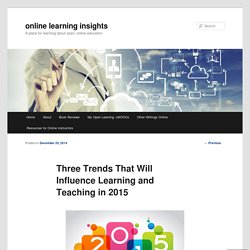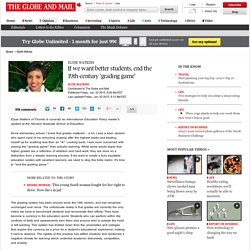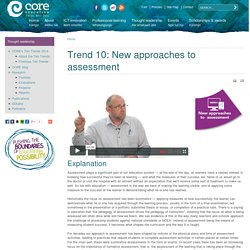

From Degrading to De-Grading. March 1999 By Alfie Kohn Pour lire cet article en français, cliquer ici.

10 Things You Don't Know About Formative Assessment. Share with Friends 3KShares Assessments come in varied forms, and they’re executed for different purposes.

While summative assessments attempt to measure mastery at the end of a learning experience, the best formative assessments illuminate the strengths and needs of learners throughout the experience, enabling teachers to respond in ways that are just right and just in time. Ready to ramp up your practice? Consider these little known facts about formative assessment. 10 Things You Don’t Know About Formative Assessment 1. 2. 3. 4. 5. 6. 7. 8.
Three Trends That Will Influence Learning and Teaching in 2015. There is no shortage of predictions for the upcoming year of 2015.

Micro-credentials, digital wearables and mobile learning are just a few of the many. Yet predictions are notorious for misleading and even wildly inaccurate assurances. But analyzing trends across industries in conjunction with developments within a sector—the education sector in this instance, is far more constructive and strategic than considering stand-alone predictions. There are themes and patterns worthy of educators, administrators and stakeholders investment of time and consideration. This post examines and explores three trends that meet the worthy criteria. Sources for Trends Affecting Education in 2015 There’ve been several articles and reports written and shared by organizations, education entities and news agencies that highlight trends, developments, and hot topics to watch for in 2015.
Allow pupils to use Google in GCSE exams, says academic. The comments are likely to fuel the debate over public exams following repeated claims by teachers’ leaders that schoolchildren in Britain are already among the most tested in Europe.

Earlier this year, Tony Little, the headmaster of Eton, insisted the UK education system was “peculiarly uninventive” and the country must row back from its tradition of “ritualised, mechanical” exams. But the comments were dismissed by one leading government adviser who insisted properly validated exams acted as a vital focus for pupils – as long as they are accompanied with a “broad and rich” curriculum. Speaking to the Times Educational Supplement, Prof Mazur said the entire exams system was geared towards learning to pass tests rather than applying knowledge. If we want better students, end the 19th-century ‘grading game’ Elyse Watkins of Toronto is currently an International Education Policy master’s student at the Harvard Graduate School of Education Since elementary school, I knew that grades mattered – a lot.

I was a keen student who spent most of my schooling chasing after the highest marks and beating myself up for anything less than an “A”. Looking back, I was more concerned with playing the “grading game” than actually learning. While some would argue that higher grades are a reflection of ambition and hard work, they are more so a distraction from a deeper learning process. If we want to create a truly equitable education system with excellent learners, we need to stop this futile metric. The grading system has been around since the 19th century, and has remained unchanged ever since. "Why Schools Should Pay More Attention To Students' Grit And Self-Control" Why Schools Should Pay More Attention To Students' Grit And Self-Control.
It may be just as important to evaluate schools based on students’ levels of motivation and perseverance as it is to judge them based on students' standardized test scores.

A report released by the National Bureau of Economic Research in December argues that policymakers tend to focus too much on test scores even though noncognitive skills, like motivation and perseverance, are just as predictive of students' future success. The researchers from the University of Chicago, Belgium's KU Leuven and Maastricht University in The Netherlands looked at the outcomes of more than 25 programs designed to boost students' cognitive and noncognitive abilities. They concluded that it is possible both to measure and to teach these noncognitive skills. Scores on the kinds of achievement tests given at U.S. schools, which measure knowledge, tend to be highly correlated with scores on IQ tests. Cognitive skills, including the abilities to focus on, analyze and remember information, are related to IQ. Allow pupils to use Google in GCSE exams, says academic.
Trend 10: New approaches to assessment. Explanation Assessment plays a significant part of our education system — at the end of the day, all learners have a vested interest in knowing how successful they’ve been at learning — and what the measures of their success are.

None of us would go to the doctor or visit the hospital with an ailment without an expectation that we’ll receive some sort of treatment to make us well. So too with education — assessment is the way we have of making the learning visible, and of applying some measure to the success of the learner in demonstrating what he or she has learned. Historically the focus on assessment has been summative — applying measures of how successfully the learner can demonstrate what he or she has acquired through the learning process, usually in the form of a final examination, but sometimes in the presentation of a portfolio, submitted thesis or essay, or completion of a practical task. Drivers Implications Learn, participate, and share: Resources.